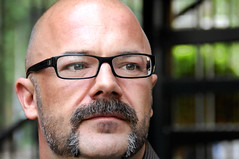
Newsweek's Latest Cover featuring Jesus Christ
“Christianity has been destroyed by politics, priests, and get-rich evangelists. Ignore them,” writes Andrew Sullivan in this week’s edition of Newsweek, “and embrace Him.”
If only it were that easy. My inner 5th-Grader (who also titled this article) wanted very much to say, “No duh.”
Now, don’t get me wrong. He’s asking a lot of the right questions. But he’s failing to understand the larger problem.
Sullivan has identified that there are people who are co-opting the Gospel message for their own benefit. Politicians of every stripe, evangelical power-hoarders, and clergy with serious problems who hide behind the cloisters of their denomination and continue the practices of their evils. He’s also left out magazine editors who call for a cover featuring Jesus, since it regularly boosts sales. But I digress.
Sullivan describes symptoms when he raises these misuses of the Gospel. And the symptoms appear to be as nasty as any of the other problems in the world. Institutional Churches are problematic. Again, not news.
The problem is similar to the one that Jefferson Bethke stumbled upon when he wrote his spoken word piece “Why I Hate Religion, but Love Jesus.” Spanning the world on YouTube in just a few weeks, “Why I Hate Religion” became the topic of water-cooler conversation, dinner table discussion, and not just a few discourses from pulpits across the country and around the world, including my own. As of this writing, the video has 20 million hits on YouTube alone.
Sullivan and Bethke have both ddiscovered an ancient and well-known problem of church. For the last 2000 years, the Church has been led by people trying, to some degree or another, to follow Jesus. But at the end of the day, we are all just people; human to the core and fallible as any cracked creation, flawed design, or willful children.
Sullivan does raise some interesting questions:
What does it matter how strictly you proclaim your belief in various doctrines if you do not live as these doctrines demand? What is politics if not a dangerous temptation toward controlling others rather than reforming oneself?
Indeed, these are questions asked across the country on a weekly and even daily basis. And these questions aren’t just asked at the water-cooler and the dinner table. These are questions asked by clergy of congregations across the country. These are questions discussed by denominational leaders. Mr. Sullivan seems to think that no one has thought of these questions to this point.
In short, Mr. Sullivan has painted all clergy and all politicians with the broadest brush in his box. By implication, we are either part of the problem or ignoring the problem. That’s a pretty harsh accusation to make. One could imagine that he is saying that we are better off without the Church.
And he has done so despite the fact that his ideas about the institutions are derived from his Irish Grandmother and her experience of Church, the writers of the books on theology he’s read (most likely a part of the Church), and his personal interactions with countless members of the Church in the course of a lifetime.
My point is not that Sullivan is ripping anyone off. My point is that we Christians are all the product of the Church in one way or another. None of us have had a natural interaction with Jesus. My faith was transmitted through interactionswith the people of the Church.
If it were so easy for all of us to just abandon the Church and just follow Jesus, I’d be locking the doors myself.
But it is not. The Church isn’t the Bishops or a Pope. The Church isn’t the doctrinal documents. The Church isn’t even to be found in the meticulously examined Scriptures.
The Church is made up of people; people who are following Christ and encouraging one another and transforming the world as best they can for the sake of the Gospel message. For all the misguided clergy and politicians in the world who are bending the Gospel to their own ends, there are thousands — millions — of believers who are quietly living their lives of faith and service.
I don’t claim to be a great leader. The only times I’ve ever been a good leader were the times that I chose to follow Jesus all the more closely. Every church I’ve ever served, I’ve clearly taught them to check my work: If I’m not following Jesus, then they have no business following me.
But to follow Jesus on your one is to run the risk of placing yourself on the throne of your own heart. And the only one who belongs there is Christ. At least within the church, you find a place to examine your ideas and to challenge yourself.
With that in mind, I welcome Andrew Sullivan to the conversation, even if he doesn’t understand that some of us have a bit of a head start.
Related articles
- Newsweek’s hipster Jesus article all hype (alanrudnick.org)
- Another “Follow Jesus, Forget the Church” Epic Fail (sethsoasis.wordpress.com)
- Hipster Jesus Here to Save Newsweek? (www.theatlanticwire.com)
- There’s a Baby in that Bathwater, Jeff (blog.ijoey.org)













Great response to this ostentatious article Rev Reed. You’re exactly right, the questions brought up by Sullivan are not anything new and don’t represent any sort of attack on Christianity that hasn’t been with us since the garden of Eden. It’s a battle of seeking the kingdom first, versus choosing our own desires.
Ultimately, the Lord will always preserve his people, even if it may be just a remnant. But what an encouragement this article is for us Christians to really live as the salt of the earth!